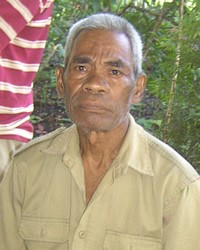Wae Rana in Indonesia

Photo Source:
Placidus Galla
|
Send Joshua Project a map of this people group.
|
| People Name: | Wae Rana |
| Country: | Indonesia |
| 10/40 Window: | Yes |
| Population: | 3,600 |
| World Population: | 3,600 |
| Primary Language: | Wae Rana |
| Primary Religion: | Christianity |
| Christian Adherents: | 80.00 % |
| Evangelicals: | 1.00 % |
| Scripture: | Translation Started |
| Ministry Resources: | No |
| Jesus Film: | No |
| Audio Recordings: | No |
| People Cluster: | Flores-Sumba-Alor |
| Affinity Bloc: | Malay Peoples |
| Progress Level: |
|
Introduction / History
The Wae Rana people inhabit two distinct enclaves in south-central Flores Island, located in Nusa Tenggara Timur Province, Indonesia. Their language, Wae Rana, belongs to the Austronesian family. While Wae Rana remains the primary language for daily communication, Indonesian is widely used for education and trade. Historically, the Wae Rana have maintained a strong cultural identity shaped by their geographic isolation and interactions with neighboring Manggarai and Ngad'a communities. Contact with external influences introduced Christianity and formal education, yet traditional customs continue to play a significant role in social life.
What Are Their Lives Like?
The Wae Rana live in rural villages where agriculture forms the backbone of daily life. Families cultivate rice, maize, and root crops, supplemented by small-scale animal husbandry. Community life is highly cooperative, with extended families sharing responsibilities for farming and cultural ceremonies. Infrastructure development remains limited, and access to healthcare and education is constrained by geographic isolation. While some younger individuals migrate to urban centers for schooling or employment, most residents maintain traditional livelihoods and social structures.
What Are Their Beliefs?
Christianity is the predominant religion among the Wae Rana, introduced through missionary activity during the colonial period. Churches and Christian festivals are central to community life. However, elements of traditional belief systems persist, particularly those associated with ancestral reverence and nature-based rituals. This syncretism reflects a cultural adaptation that integrates Christian practices with indigenous spiritual concepts.
What Are Their Needs?
Healthcare services are inadequate, leaving communities vulnerable to preventable diseases and lacking access to emergency care. Educational resources are limited, particularly in remote areas, which restricts literacy and vocational development for younger generations. Economic opportunities remain scarce, as dependence on subsistence farming exposes families to environmental risks and market fluctuations.
Prayer Points
Pray for improved access to healthcare and education so that physical needs are met alongside spiritual growth, promoting holistic well-being and stability.
Pray for the Wae Rana to experience a deep and enduring faith that strengthens their communities and fosters spiritual renewal.
Ask for wisdom and perseverance for those working to disciple and equip local believers to share the gospel effectively within their cultural context.